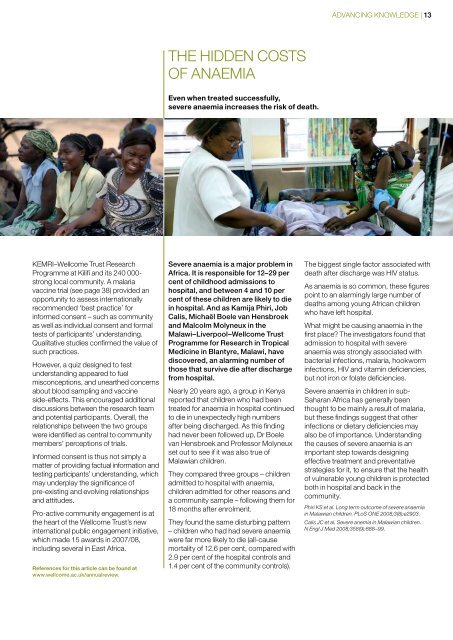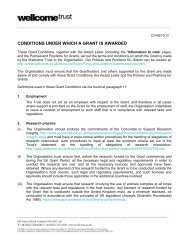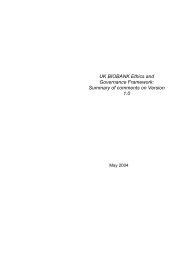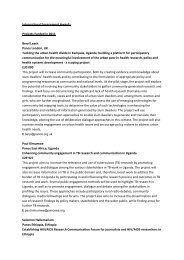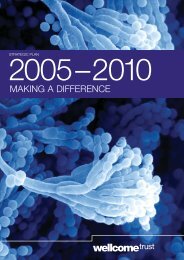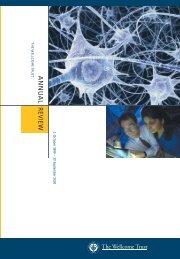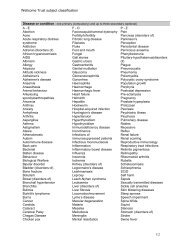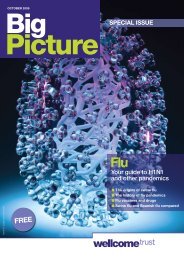Create successful ePaper yourself
Turn your PDF publications into a flip-book with our unique Google optimized e-Paper software.
advancing Knowledge | 13<br />
The hidden costs<br />
of anaemia<br />
Even when treated successfully,<br />
severe anaemia increases the risk of death.<br />
3 4<br />
KEMRI–<strong>Wellcome</strong> <strong>Trust</strong> Research<br />
Programme at Kilifi and its 240 000-<br />
strong local community. A malaria<br />
vaccine trial (see page 38) provided an<br />
opportunity to assess internationally<br />
recommended ‘best practice’ for<br />
informed consent – such as community<br />
as well as individual consent and formal<br />
tests of participants’ understanding.<br />
Qualitative studies confirmed the value of<br />
such practices.<br />
However, a quiz designed to test<br />
understanding appeared to fuel<br />
misconceptions, and unearthed concerns<br />
about blood sampling and vaccine<br />
side-effects. This encouraged additional<br />
discussions between the research team<br />
and potential participants. Overall, the<br />
relationships between the two groups<br />
were identified as central to community<br />
members’ perceptions of trials.<br />
Informed consent is thus not simply a<br />
matter of providing factual information and<br />
testing participants’ understanding, which<br />
may underplay the significance of<br />
pre-existing and evolving relationships<br />
and attitudes.<br />
Pro-active community engagement is at<br />
the heart of the <strong>Wellcome</strong> <strong>Trust</strong>’s new<br />
international public engagement initiative,<br />
which made 15 awards in 2007/08,<br />
including several in East Africa.<br />
References for this article can be found at<br />
www.wellcome.ac.uk/annualreview.<br />
Severe anaemia is a major problem in<br />
Africa. It is responsible for 12–29 per<br />
cent of childhood admissions to<br />
hospital, and between 4 and 10 per<br />
cent of these children are likely to die<br />
in hospital. And as Kamija Phiri, Job<br />
Calis, Michaël Boele van Hensbroek<br />
and Malcolm Molyneux in the<br />
Malawi–Liverpool–<strong>Wellcome</strong> <strong>Trust</strong><br />
Programme for Research in Tropical<br />
Medicine in Blantyre, Malawi, have<br />
discovered, an alarming number of<br />
those that survive die after discharge<br />
from hospital.<br />
Nearly 20 years ago, a group in Kenya<br />
reported that children who had been<br />
treated for anaemia in hospital continued<br />
to die in unexpectedly high numbers<br />
after being discharged. As this finding<br />
had never been followed up, Dr Boele<br />
van Hensbroek and Professor Molyneux<br />
set out to see if it was also true of<br />
Malawian children.<br />
They compared three groups – children<br />
admitted to hospital with anaemia,<br />
children admitted for other reasons and<br />
a community sample – following them for<br />
18 months after enrolment.<br />
They found the same disturbing pattern<br />
– children who had had severe anaemia<br />
were far more likely to die (all-cause<br />
mortality of 12.6 per cent, compared with<br />
2.9 per cent of the hospital controls and<br />
1.4 per cent of the community controls).<br />
The biggest single factor associated with<br />
death after discharge was HIV status.<br />
As anaemia is so common, these figures<br />
point to an alarmingly large number of<br />
deaths among young African children<br />
who have left hospital.<br />
What might be causing anaemia in the<br />
first place? The investigators found that<br />
admission to hospital with severe<br />
anaemia was strongly associated with<br />
bacterial infections, malaria, hookworm<br />
infections, HIV and vitamin deficiencies,<br />
but not iron or folate deficiencies.<br />
Severe anaemia in children in sub-<br />
Saharan Africa has generally been<br />
thought to be mainly a result of malaria,<br />
but these findings suggest that other<br />
infections or dietary deficiencies may<br />
also be of importance. Understanding<br />
the causes of severe anaemia is an<br />
important step towards designing<br />
effective treatment and preventative<br />
strategies for it, to ensure that the health<br />
of vulnerable young children is protected<br />
both in hospital and back in the<br />
community.<br />
Phiri KS et al. Long term outcome of severe anaemia<br />
in Malawian children. PLoS ONE 2008;3(8):e2903.<br />
Calis JC et al. Severe anemia in Malawian children.<br />
N Engl J Med 2008;358(9):888–99.


